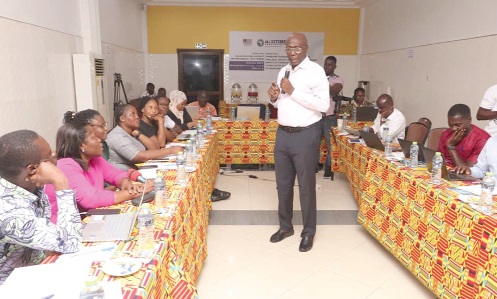
Centre calls for maritime collaboration to manage territorial resources
The Centre for Maritime Law and Security (CEMLAWS) has called for increased collaboration and effective policy implementation to govern the maritime environment.
The organisation emphasises the need for legislation and institutions to work in tandem to manage Ghana's territorial water resources effectively.
Speaking at a Monitoring, Control and Surveillance (MCS) Pilot Training for Fisheries Enforcement Officers, the Executive Director of CEMLAWS, Dr Kamal-Deen Ali, highlighted the importance of collaboration and policy implementation to regulate distant water fishing vessels and safeguard Ghana's marine resources.
Training
The training, organised in partnership with the University of Cape Coast (UCC) and the Centre for Coastal Management (CCM), with funding from the United States Department of State, is part of a broader project aimed at addressing the destabilising impacts of foreign distant water fishing vessels.
The training aims to enhance the implementation of fisheries management measures and promote compliance.
It covered a range of topics, including maritime jurisdictions, balancing legal rights and interests, exclusive economic zones, freedom of navigation and overflight, sovereign rights for resource exploitation, and institutional frameworks at the national, regional and international levels.
Participants from the Ghana Navy, Ghana Police, Ghana Ports and Harbours Authority, CCM, and the Fisheries Commission attended the training.
Under the project, CEMLAWS and its partners have also provided training to journalists and civil society organisations in several African countries, including Benin, Cameroun, Côte d'Ivoire, Ghana, Mauritania, Senegal and Sierra Leone.
Territorial waters
Dr Ali stressed the need to equip personnel in the fisheries and maritime sectors with the necessary knowledge and skills to enforce legal and jurisdictional regulations.
He noted that while there were opportunities to harness the full potential of territorial waters and hold foreign vessels accountable for unregulated activities, Ghana and other African countries often failed to take advantage of those options.
That, he said, led to significant losses in terms of sustainability, food security and resource depletion.
“One major issue contributing to the decline of the fishery sector is the exportation of a significant portion of raw materials to other countries, resulting in a loss of output for the exporting nations”, Dr Ali said.
He emphasised the importance of registering and licensing foreign vessels through the Office of the Registrar of Companies (ORC), and monitoring of their activities collaboratively to ensure that their profits benefited Ghana.
Capacity-building
The Director of the Centre for Coastal Management at the University of Cape Coast, Denis Aheto, underscored the sensitivity of maritime issues and the need for continuous learning, research and capacity-building to improve monitoring and surveillance.
He encouraged participants to pursue further education and training to strengthen Ghana's capabilities in this area.
